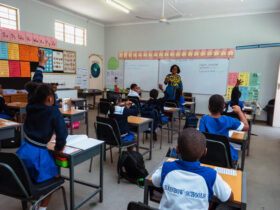
Mathematics Performance in Tanzania; Mathematics is a crucial subject in the education system of Tanzania. It serves as the foundation for many other fields, including science, engineering, economics, and technology.
A strong understanding of mathematics equips students with essential problem-solving skills and logical thinking that are useful in both academic and everyday life.
However, despite its importance, the performance of students in mathematics in Tanzania has been a topic of concern for many years.
In this blog post, we will explore the current state of mathematics performance in Tanzania, the challenges faced by students and educators, and potential solutions to improve learning outcomes in this vital subject.

The Current State of Mathematics Performance in Tanzania
In recent years, there has been significant emphasis on improving education in Tanzania, particularly in subjects like mathematics. However, the performance of students in mathematics, especially in public examinations such as the Form 4 and Form 6 national exams, has shown that there are still several issues to address.
Examination Results
The results of national exams, like the National Examination Council of Tanzania (NECTA) exams for both O-level (Form 4) and A-level (Form 6), often reflect the challenges faced in mathematics. In these exams, mathematics has traditionally been one of the subjects with lower pass rates compared to others.
Many students struggle to achieve satisfactory results, and this has raised concerns among educators, parents, and policymakers.
For example, in the 2020 NECTA Form 4 results, mathematics was one of the subjects with a lower pass rate, with a significant number of students scoring below the required grade for further studies.
The pass rate for mathematics at the Form 4 level has typically been around 50% in recent years, meaning that half of the students are not meeting the minimum standard.
Challenges Affecting Mathematics Performance in Tanzania
Several factors contribute to the challenges in mathematics performance in Tanzania. These factors range from educational, social, and economic issues, to teaching and learning methods.
1. Lack of Qualified Teachers
One of the main reasons for poor performance in mathematics is the shortage of well-trained and qualified mathematics teachers. In many schools, especially in rural areas, there is a lack of teachers who are specialized in teaching mathematics.
Some teachers may not have the necessary qualifications or experience to effectively teach the subject. This leads to gaps in students’ understanding of key mathematical concepts.
2. Outdated Teaching Methods
Many teachers in Tanzania still rely on traditional teaching methods that do not engage students in active learning. In the past, the emphasis has often been on rote memorization, where students are expected to memorize formulas and procedures without truly understanding the concepts behind them.
This approach can lead to a lack of critical thinking and problem-solving skills, making it difficult for students to apply mathematical knowledge in real-life situations.
In modern education, teaching methods that focus on practical, interactive, and problem-solving approaches are gaining attention. However, many schools are yet to fully adopt these innovative teaching methods, which impacts student engagement and understanding.
3. Limited Resources and Infrastructure
Many schools in Tanzania, particularly in rural areas, face challenges with limited resources and infrastructure. Classrooms may lack essential teaching materials like textbooks, calculators, and other mathematical tools.
In some cases, students may not even have access to basic equipment, such as chalk and blackboards. This limits the ability of teachers to effectively teach mathematics and students to practice and learn the subject.
Additionally, schools may not have access to modern technology, such as computers or internet connections, which are crucial for enhancing the teaching and learning of mathematics.
Without such resources, students are unable to access online tutorials, educational games, and other digital learning tools that could enhance their understanding of the subject.
4. Student Attitudes and Anxiety Towards Mathematics
Mathematics is often seen as a difficult subject by many students in Tanzania. This negative attitude towards mathematics can result in a lack of motivation to study the subject.
Many students develop math anxiety, where they become afraid or stressed when faced with mathematical problems. This anxiety can create a mental block, making it even harder for students to grasp basic mathematical concepts.
The perception that mathematics is a subject only for “geniuses” or students with a natural talent can further discourage many students from trying their best in the subject. As a result, students may give up on improving their mathematical skills, leading to poor performance in exams.
5. Parental Involvement and Support
In some communities, there is limited involvement from parents when it comes to their children’s education, particularly in subjects like mathematics.
Many parents may not have the necessary knowledge or skills to support their children with homework or exam preparation, especially in higher-level mathematics topics. Without this support, students may struggle to complete their assignments and understand the subject better.
Strategies for Improving Mathematics Performance in Tanzania
While the challenges are significant, there are several strategies that can help improve the performance of students in mathematics in Tanzania. These solutions involve a combination of changes in teaching methods, resources, and student attitudes.
1. Training and Professional Development for Teachers
To address the shortage of qualified mathematics teachers, there is a need for continuous teacher training and professional development. Teachers must be equipped with the necessary skills to teach mathematics effectively, using modern methods that engage students. Workshops, seminars, and in-service training should be offered regularly to help teachers improve their pedagogical approaches.
Additionally, encouraging the teaching of mathematics in a more practical, real-world context can help make the subject more interesting and relatable to students.
2. Adopting Interactive and Student-Centered Teaching Methods
To move away from traditional rote learning, teachers should focus on interactive teaching methods that promote critical thinking, problem-solving, and collaboration. Using visual aids, group activities, and hands-on projects can help students better understand mathematical concepts.
Mathematics should be taught in a way that allows students to actively engage with the subject, rather than simply memorizing facts. This approach will help students build a deeper understanding of mathematics and encourage them to see the subject as relevant to their daily lives.
3. Increasing Access to Resources
Improving access to educational resources is key to improving mathematics performance. Schools should invest in textbooks, learning materials, and educational tools that are essential for teaching mathematics effectively. In addition, the government and other stakeholders should invest in technology, such as computers and internet access, so that students can benefit from digital learning resources.
Furthermore, mobile phone technology could be leveraged to provide students with access to educational apps and websites that offer math tutorials, exercises, and videos.
4. Promoting Positive Attitudes Towards Mathematics
Changing the negative perception of mathematics is essential for improving student performance. This can be achieved by promoting the idea that anyone can learn mathematics with the right effort and mindset. Teachers, parents, and community leaders can encourage students to see mathematics as a subject that is both useful and fun.
It is also important to provide students with examples of how mathematics is used in real life, such as in engineering, business, technology, and even everyday activities like budgeting and planning. This can motivate students to see the subject as relevant to their future goals.
5. Parental and Community Support
Parents should be encouraged to take an active role in their children’s education. This could involve helping with homework, encouraging their children to study mathematics regularly, and showing a positive attitude toward the subject.
Communities can also help by organizing extra-curricular math programs or tutoring sessions for students who need additional support.
Conclusion
The performance of students in mathematics in Tanzania remains a significant challenge, but it is not insurmountable.
By addressing issues such as the lack of qualified teachers, outdated teaching methods, limited resources, and negative attitudes towards the subject, Tanzania can make great strides in improving mathematics education.
Related articles
- Mathematics Syllabus for Primary School in Tanzania-elimuhuru
- History of Mathematics in Tanzania-elimuhuru
- Top 10 Best Private Secondary Schools in Tanzania-Elimuhuru
- Top 50 Best Secondary Schools in Tanzania-Elimuhuru
- Education system in tanzania 2024-Elimuhuru
- Tanzania Education Statistics-Elimuhuru
- Scholarships in Tanzanian Universities-Elimuhuru
- Tanzania school fees: A Guide for Parents and Students
- International School of Tanganyika Fees-Elimuhuru
- Ahmes Secondary School Fees-Elimuhuru
- Ahmes Secondary School Application Form 2024-Elimuhuru









Leave a Reply